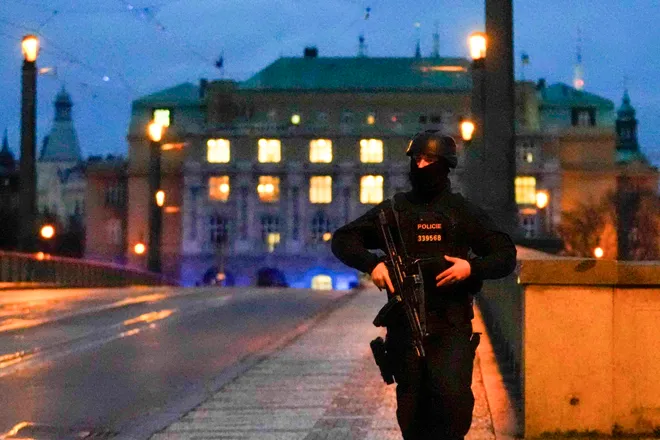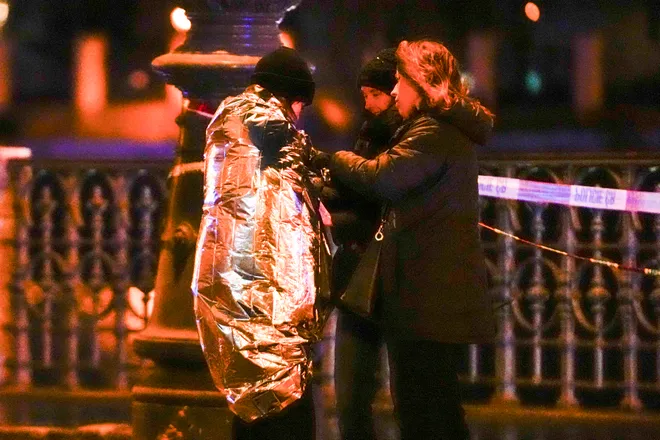How often do mass shootings happen in Europe? Experts say Prague tragedy could shake the Czech Republic for years
The Czech Republic is reeling from the worst mass shooting in the nation’s history after a gunman fired shots into a university building in the capital city of Prague on Thursday, killing 14 people and injuring more than two dozen others.
"It’s a horrible crime, something the Czech Republic has never experienced," said Czech Interior Minister Vit Rakusan about the deadly massacre, which prompted an emergency government meeting Thursday evening.
Unlike in the United States, mass shootings are rare in Europe. The tragedy in Prague could shake the nation for years and possibly shape the nation's approach to gun control in the future, according to international gun violence experts.
"The most important takeaway right now is there are a lot of people today who were impacted by this tragedy and who will be feeling reverberations of this for years to come," said Jaclyn Schildkraut, the executive director of Rockefeller Institute of Government's Regional Gun Violence Research Consortium. The group of gun violence researchers and practitioners provide policy recommendations to lawmakers in their effort to combat gun violence.
"This is a shooting that happened around the holidays and there will now have 15 seats empty at holiday tables," said Schildkraut, adding: "There are dozens more who are spending the holidays now in the hospital potentially with gunshot wounds."
What happened in Prague?
A student – who police say was a legal gun owner with a large arsenal of weapons at home – opened fire into a Charles University campus building Thursday. Police said the shooter died by suicide.
Authorities said they received a tip the gunman planned to attend a lecture at a different building in the area and conducted a search but did not locate the shooter. Gunshots broke out at a nearby location about one hour later.
Though Thursday's deadly attack was unprecedented, the Czech Republic has faced shooting tragedies before. The Czech Republic’s last deadliest mass shooting happened when a gunman opened fire in the southeastern town of Uhersky Brod, killing eight before fatally shooting himself in 2015.

'Countries have responded with very sweeping policy changes'
Mass shootings are more infrequent in European countries than in the United States, said Mark Bryant, the executive director of the Gun Violence Archive, a non-profit organization that tracks mass shootings in the U.S. The group is currently developing a database on international mass shootings.
"When we look at this incident – and we’re looking right now at 15 killed – it puts it in the top eight of all mass shootings," Bryant said. "We know that this is big, but this is kind of an outlier. To add to the texture of this, the gun laws in the Czech Republic are more loose than the rest of the European Union."
According to Schildkraut, the Czech Republic could mimic other European countries that have enacted stricter gun laws after rare mass shootings in response.
"Relatively speaking, in these countries where (mass shootings are) even more rare, we see it doesn’t take numerous incidents to have change and that it usually only takes one," she said. "Countries have responded with very sweeping policy changes like banning personal firearms or significantly reducing access to the point where people are holding gun buybacks."
Schildkraut pointed to mass shootings in other European countries, including the Dunblane massacre in Scotland and the Hungerford massacre in Great Britain.
In 1996, a gunman killed 16 young children and their teacher at a primary school in Scotland before killing himself. After the massacre, a resident-driven campaign called "the Snowdrop Campaign" eventually led to a ban on private handguns in Great Britain, NBC News reported.
In another mass shooting in Great Britain, a gunman killed 16 people and injured 15 others in 1987, which prompted the Parliament of the United Kingdom to pass the Firearms (Amendment) Act 1988. The legislation bans semi-automatic center-fire rifles and puts other restrictions on firearms in the country.
"Both led to legislation regarding firearms," Schildkraut said.
The Czech Republic is a rarity in Europe when it comes to gun ownership, Bryant said. In the Czech Republic, people have to pass several tests to own a gun, he said. Still the gun laws there are much more stringent than gun laws in the U.S., he said.
'Copycat phenomenon of American mass shooters'
Only five countries had more than two mass shootings from 1998 to 2019, according to a study published in 2022 in the International Journal of Comparative and Applied Criminal Justice that analyzes mass shootings in which four or more were killed in the U.S. and 35 other high-income countries. The U.S. had 101 mass shootings and accounted for 73% of all the mass shooting incidents in these countries during this period, the study highlighted.
But mass shootings are also rising across the globe, said Jason Silva, an assistant professor of sociology and criminal justice at William Paterson University. Silva said he is concerned about the "globalization of American mass shootings."
"There's a copycat phenomenon of American mass shooters and it's catching hold in other countries," Silva said, adding that Thursday's massacre in Prague "sort of capsulated the school shooter typology we saw grow popular in the U.S."

Contributing: Associated Press; Cybele Mayes-Osterman, Nikol Mudrova, and Minnah Arshad; Wyatte Grantham-Philips; USA TODAY
Contact Kayla Jimenez at kjimenez@usatoday.com. Follow her on X, formerly Twitter, at @kaylajjimenez.
Disclaimer: The copyright of this article belongs to the original author. Reposting this article is solely for the purpose of information dissemination and does not constitute any investment advice. If there is any infringement, please contact us immediately. We will make corrections or deletions as necessary. Thank you.







